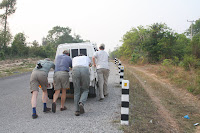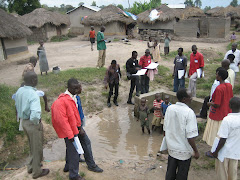Tuesday, September 28, 2010
Hosanna Project - Great news!
Initiated in February 2007, the Hosanna Project targeted ten rural communities (kebeles), with a total population of 55,800. Four Lifewater teams trained indigenous trainers who trained community leaders. According to government surveys, the independent baseline survey, and the final project evaluation, the Hosanna Project boosted latrine coverage in the project area from 60.9 percent to 97.2 percent. Not reflected in these numbers is the significant improvements made in 5,390 old latrines, many of which had been counted in the baseline survey but were deemed inadequate. The local government health offices responsible for monitoring public health reported that acute watery diarrhea, which had been the number two health risk to children dropped completely out of the top ten. In one survey conducted at the project’s conclusion, only 16 of 396 families with children under five years old had an incidence of diarrhea in the past two weeks (4 percent). In the baseline survey, the number was 63 (43 percent). For more details go to www.Lifewater.org
Monday, March 22, 2010
March , 2010/ Lifewater trip #8/ SE Asia





While looking out the window of our turboprop in the Bangkok airport, I remember thinking: “I hope that bald tire doesn’t blow.” It was beyond bald; the core was showing. And, when our ride from the airport quit running half way to our final destination, memories of my first trip to Uganda came back. We had stopped about 7 times in the middle of Uganda to refill the radiator until it wouldn’t hold anything. This time the truck quit right across the street from a mechanic. He spent something under an hour fixing it -- just good enough to get us about 5 miles out of town. But, with God on our side, we found humor in our situations. Some locals who were watching us trying to push start the truck and laughing about it, came over and laughed with us a while before telling us of a (better) mechanic a few miles ahead.
Our training partner is required to operate as a for profit business, so we had to conduct this sanitation training in a way that complies with the country’s rules. Do you know how many engineers it takes to design & build a latrine? We didn’t either, so there were four of us on this trip. We even had a retired judge as part of our team to act as mediator. We ended up building (you got it) four different latrines at a village with a school of about 140 children and no functional latrines. All of our Asian students had at least a high school education, and an Australian, who will be working with them, has a degree in a related field of engineering. We told our students we wanted them to have a tool box full of options to fit different situations. About the time we were finished with construction, we took the students to lunch at the river. The restaurant apparently didn’t have enough food, so the hostess plopped a line over the side and had a good sized fish within seconds. I wouldn’t wash my hands with that water, so no telling what trace minerals that fish added to my diet. With the temperature over 100 and humidity close to that, a couple of them jumped in for a quick swim.
The people were amazingly friendly. It is absolutely fantastic to see the economic progress the country has made and why it is becoming a popular ecotourism destination. Our partner cannot simply provide subsidized sanitation as in Africa, so we suggested that they consider Jesus’ teaching of a person who build his house on a solid foundation (Matt 7:24-27). The analogy is that, while WASH (WAter, Sanitation & Hygiene) will not make you rich, you cannot be prosperous without the good health and other benefits of WASH. As with all the prior trips, this was an incredibly gratifying experience. You are missing a life changing experience filled with wonderful memories if you haven’t helped people in a developing country.
The people were amazingly friendly. It is absolutely fantastic to see the economic progress the country has made and why it is becoming a popular ecotourism destination. Our partner cannot simply provide subsidized sanitation as in Africa, so we suggested that they consider Jesus’ teaching of a person who build his house on a solid foundation (Matt 7:24-27). The analogy is that, while WASH (WAter, Sanitation & Hygiene) will not make you rich, you cannot be prosperous without the good health and other benefits of WASH. As with all the prior trips, this was an incredibly gratifying experience. You are missing a life changing experience filled with wonderful memories if you haven’t helped people in a developing country.
Subscribe to:
Posts (Atom)
